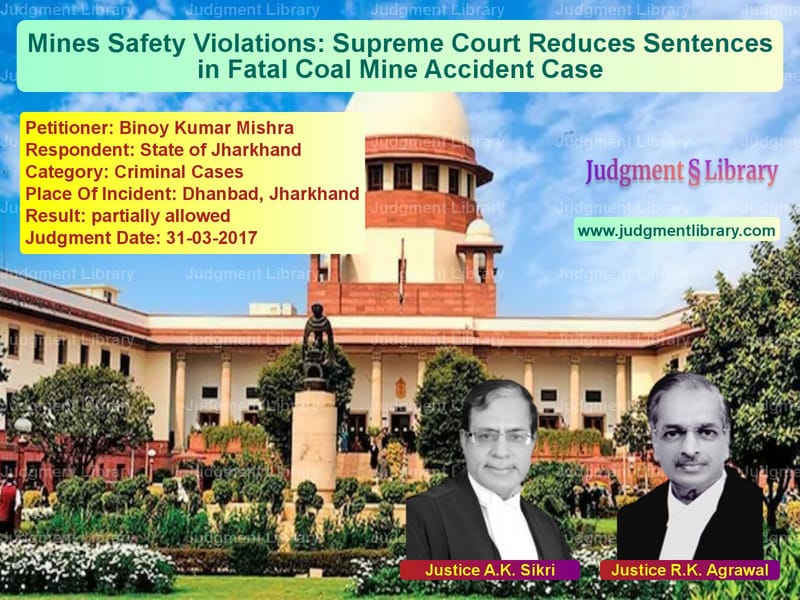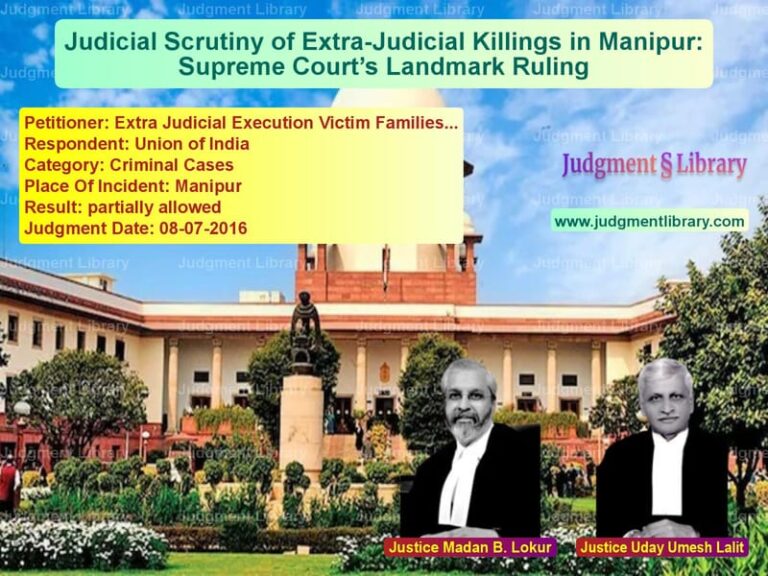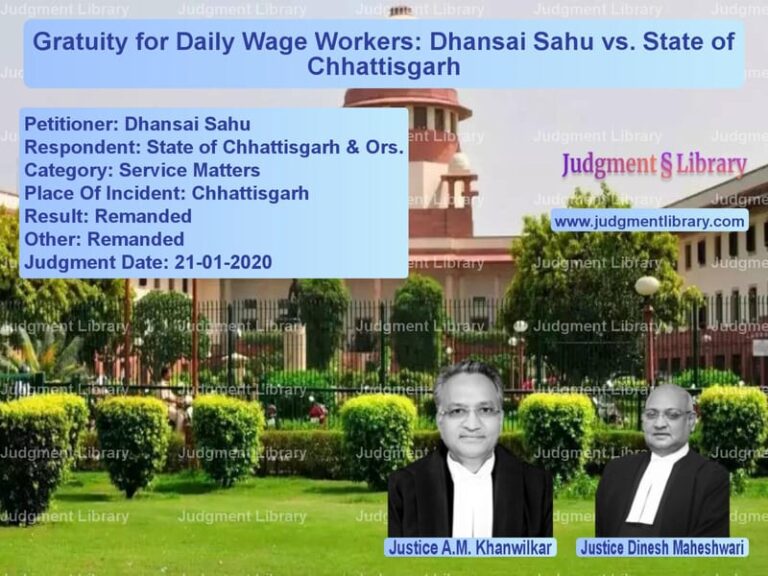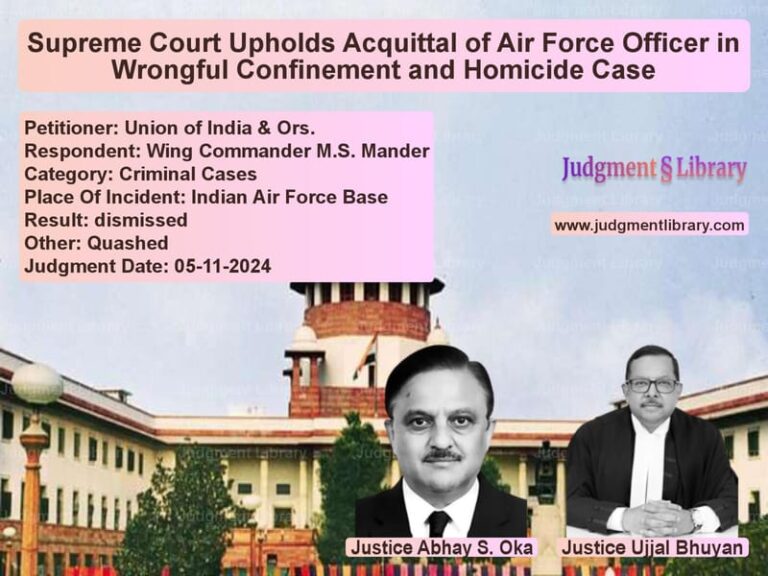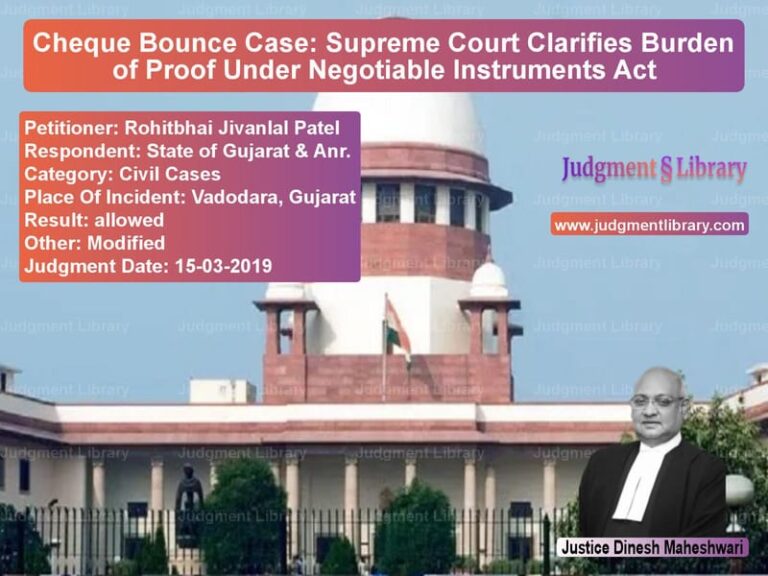Mines Safety Violations: Supreme Court Reduces Sentences in Fatal Coal Mine Accident Case
The case of Binoy Kumar Mishra v. State of Jharkhand pertains to a serious mining accident that took place in the Kusunda Colliery, Dhanbad, on January 5, 1996, which resulted in the death of four miners and serious injuries to five others. The tragedy was caused by a roof collapse in the mine due to inadequate safety measures. The appellants in this case, including Binoy Kumar Mishra, the Manager of the mine, were convicted for violating the safety regulations under the Mines Act, 1952. They were sentenced to terms of imprisonment and fines for their roles in the mishap. The Supreme Court was tasked with reviewing the High Court’s decision to uphold the conviction and sentence of these individuals, specifically Binoy Kumar Mishra, Mahendra Prasad Gupta, Madhusudan Banerjee, and Nageshwar Sharma.
After considering the appeal and the circumstances of the case, the Supreme Court modified the sentences for two of the appellants and set aside the convictions for the others. This judgment emphasizes the importance of adherence to safety regulations and the accountability of individuals in positions of responsibility, while also considering the health and age of the accused in determining the appropriate sentence.
Background of the Case
The incident in question occurred at the Kusunda Colliery when a group of miners was engaged in loading coal at Junction 9, East Level. The roof of the mine, measuring 7.6 meters by 6.1 meters and 0.20 meters thick, collapsed from a height of 2.8 meters. This led to the tragic death of four workers and injuries to five others. The accident was reported, and the Director of Mines Safety commenced an investigation under Section 23(2) of the Mines Act, 1952. The investigation revealed several violations of safety regulations, including the failure to properly support the roof, which was known to be unstable.
The prosecution claimed that the accused, who were in charge of various managerial positions at the colliery, had failed to ensure that the required safety measures, as stipulated by the Systematic Support Rules (SSR) and other regulations, were implemented. Despite warnings from workers regarding the bad condition of the roof, the accused allowed work to continue without proper support, resulting in the accident.
Petitioner’s Arguments Before the Supreme Court
In their appeal, the appellants raised several points of law and fact:
- The violation of the SSR was not attributable to the appellants, as they were not directly responsible for the installation of safety equipment such as roof bolts and W straps.
- The departmental inquiry had exonerated the appellant Binoy Kumar Mishra, the Manager, and the other accused were not directly involved in the incident.
- The investigation report failed to establish a clear and specific connection between the actions of the appellants and the accident, as it was primarily due to the failure of the Mining Sirdar and other workers.
- The appellant Binoy Kumar Mishra had no prior knowledge of the dangers posed by the roof and had taken steps to ensure the safety of the workers.
Respondent’s Counterarguments
The respondent, representing the State, countered the appellants’ arguments by emphasizing the responsibility of the appellants under the Mines Act, 1952:
- The appellants, especially the manager, were responsible for ensuring that the mine operated safely and in compliance with all regulations, including the SSR.
- The failure to properly support the roof and the disregard for safety measures directly contributed to the accident and the loss of life.
- The prosecution had presented sufficient evidence to prove the appellants’ negligence, and their roles in the mismanagement of the mine were clearly established.
Supreme Court’s Judgment
The Supreme Court, comprising Justices A.K. Sikri and R.K. Agrawal, made the following observations and rulings:
- The accident was caused by the failure of the mine management to adhere to the mandatory safety regulations, which led to the collapse of the roof and the resulting fatalities and injuries.
- The appellant Binoy Kumar Mishra, as the manager of the mine, had a clear responsibility to ensure that the mine was operated safely, including ensuring proper roof support in compliance with the SSR.
- However, the Court noted that the appellant Binoy Kumar Mishra had been exonerated in the departmental inquiry, and there was no direct evidence to establish his culpability in causing the accident.
- The appellant Madhusudan Banerjee, who was responsible for the mine’s overall management, was also found to have failed to ensure compliance with the SSR and was similarly held accountable for the accident.
- The Court, in its judgment, acknowledged that while the appellants were responsible for the violations, the severity of their actions varied, and this should be reflected in their sentences.
- The convictions of Mahendra Prasad Gupta and Nageshwar Sharma were set aside, as the Court found no sufficient evidence to establish their involvement in the mishap.
- The sentences for Binoy Kumar Mishra and Madhusudan Banerjee were modified. Given their age and health conditions, including severe cardiac issues and previous medical history, the Court imposed only fines instead of imprisonment.
- Binoy Kumar Mishra was fined Rs. 2,000 for the offence under Section 72A, Rs. 5,000 for the offence under Section 72C(1)(a), and Rs. 3,000 for the offence under Section 72C(1)(b) of the Mines Act, 1952. The sentence was modified to the maximum fine allowed under these provisions.
- The appeals of Mahendra Prasad Gupta and Nageshwar Sharma were allowed, and their convictions were set aside.
Key Legal Takeaways
This judgment highlights several critical aspects of mining safety and liability:
- Strict Responsibility of Managers: The judgment reinforces the responsibility of mine managers to ensure compliance with safety regulations, particularly the Systematic Support Rules (SSR), to prevent accidents.
- Criminal Liability for Negligence: The case demonstrates that even if an accident occurs due to negligence in enforcing safety measures, criminal liability can be imposed on those responsible for the management of the mine.
- Role of Evidence in Proving Culpability: The judgment emphasizes the importance of having clear and direct evidence to establish the specific role of each accused in contributing to an accident.
- Modified Sentences Based on Health Conditions: The Court showed leniency in sentencing the appellants, particularly in light of their health conditions and the fact that the incident occurred over 20 years ago.
Implications for Future Cases
This judgment sets important precedents for future mining safety cases:
- Mine owners, agents, and managers must adhere to strict safety protocols and ensure the implementation of all safety measures to prevent accidents.
- Even in cases of long delays in litigation, the courts must balance the severity of the violation with the health and age of the accused when determining sentences.
- In criminal cases related to safety violations, evidence must be specific, and the burden of proof lies with the prosecution to establish the direct involvement of each accused party.
Conclusion
The Supreme Court’s ruling in Binoy Kumar Mishra v. State of Jharkhand is a landmark decision emphasizing accountability in the mining industry. While the Court upheld the conviction of certain individuals, it also recognized the need for leniency in sentencing based on personal circumstances, particularly in cases involving long delays and health issues. This case underscores the importance of compliance with safety regulations and highlights the critical role of managerial oversight in preventing fatal accidents in high-risk industries.
Don’t miss out on the full details! Download the complete judgment in PDF format below and gain valuable insights instantly!
Download Judgment: Binoy Kumar Mishra vs State of Jharkhand Supreme Court of India Judgment Dated 31-03-2017.pdf
Direct Downlaod Judgment: Direct downlaod this Judgment
See all petitions in Employment Disputes
See all petitions in Workplace Harassment
See all petitions in Termination Cases
See all petitions in Judgment by A.K. Sikri
See all petitions in Judgment by R K Agrawal
See all petitions in partially allowed
See all petitions in supreme court of India judgments March 2017
See all petitions in 2017 judgments
See all posts in Criminal Cases Category
See all allowed petitions in Criminal Cases Category
See all Dismissed petitions in Criminal Cases Category
See all partially allowed petitions in Criminal Cases Category

